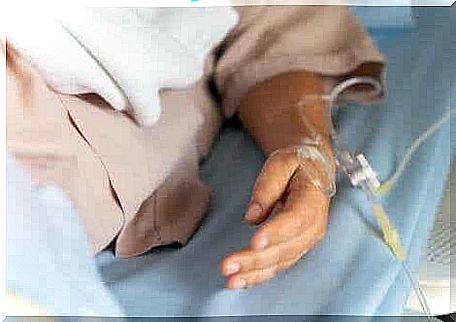Symptoms Of Lead Poisoning

Lead poisoning is a fairly rare problem, but it can lead to serious complications if not treated appropriately. Lead is a heavy metal that is a dangerous chemical compound, so any amount of it is enough to cause poisoning. Therefore, it is important to understand the symptoms of lead poisoning.
In the past, lead was commonly used in paints, fuels and other products. Fortunately, research and public policy to reduce its use have proven effective. Still, isolated cases can occur when people are exposed to it in their jobs or live in old houses.
Its symptoms are very nonspecific and the main risk groups are pregnant women and young children.
Want to know more about it?
In this article, we will tell you everything you need on this topic.
What causes lead poisoning?
Lead poisoning occurs when a person swallows or inhales large amounts of this heavy metal. Until recently, it was a fairly common problem because many products and fuels contained significant amounts of lead.
But with the intervention of international organizations such as the World Health Organization, cases have gradually diminished. You will find lead in particular in the following places and places:
- House paint
- Old toys
- Pipes and taps
- Car batteries
- Some glasses and pottery
- Pellets
- Some cosmetics
- Floors, especially if petrol or paint has been spilled on them.
In the late 1970s, some measures were introduced in the United States to curb lead poisoning. As a result, most lead-based paints had to change their manufacturing processes.
Occupational exposure to lead is common in those working in ship repair, construction, mining, plastics or batteries, and sewerage.
In theory, these professions should follow their own preventive system based on the occupational health system. In some cases, however, accidents at work occur.

Symptoms of lead poisoning in adults
Depending on the degree of poisoning, the symptoms of lead poisoning can range from very mild to even fatal. Because the symptoms are quite nonspecific, it is unlikely that you will be able to detect the problem quickly. The following symptoms may occur:
- Risen bloodpressure
- Anemia
- Headaches, abdominal, muscle and joint pain
- Problems with short-term memory and concentration
- Weakness
- Loss of appetite
- Constipation
- Irritability
These symptoms tend to develop gradually. In addition, as long as you come into contact with the poison (for example, at work or at home), your symptoms will get worse over time.
Symptoms of lead poisoning in newborns
Because lead can penetrate the placenta, it can affect the developing fetus during pregnancy. The fact that many cases of lead poisoning can go unnoticed by mothers is a serious problem for babies.
Lead poisoning can lead to serious complications during pregnancy. These may include miscarriage, premature birth, and intrauterine growth restriction (IUGR). In rare cases, complications can be fatal.
If a child is born, he or she is very prone to medical complications, especially before the age of five. In fact, fatal encephalopathies associated with lead poisoning have been reported.
Even if patients receive timely treatment, the consequences can be serious. Some of the complications a baby can experience throughout their lives are cognitive difficulties, irritability, and memory problems.
How is lead poisoning diagnosed?
Lead poisoning is not usually actively treated in hospitals, except in very specific cases of work or home exposure. In fact, if a patient’s symptoms are very mild, the doctor may make a misdiagnosis.
The only way to diagnose the disease objectively is with blood tests that measure lead levels. The amount depends on each laboratory, but since lead has no functions in the body at all, any level can be considered toxic.
Major medical complications may occur above 5 µg / dl, especially in children less than five years of age. In some patients, concentrations may be 150 µg / dl or more.
Additional experiments
If you need hospital treatment or tests to be performed later, it is very likely that your doctor will prescribe the following tests:
- Complete hematological biometrics (BHC) or complete hematology (HC). This will allow your doctor to see your hemoglobin level, which may drop in the event of chronic poisoning.
- Econogram or abdominal radiograph. These tests help rule out the possibility of inflammatory damage.
- Biopsy or bone marrow aspiration. This test is used to rule out other causes of anemia, especially when other blood levels change. These results are usually normal.
- X-ray of a long bone. Because lead tends to accumulate in bone tissue, this test provides important information such as the estimated time of exposure and the severity of the poisoning. Some researchers even use it as one of the best diagnostic indicators, as this study suggests.
How is lead poisoning treated?
Once a diagnosis has been made by a physician, treatment depends on the severity of the symptoms and the estimated time of intoxication.
If the patient has mild symptoms, monitoring and oral medications may be prescribed. In severe cases, the patient is admitted to the hospital and given intravenous treatment.
In the case of acute poisoning, the patient is more likely to be hospitalized. Depending on the severity, chronic diseases can be treated more conservatively.
In both cases, treatment consists of basic support measures and medications. Supportive measures require intravenous solutions and gastrointestinal lavage, while drugs chelate the compounds.
The latter term refers to drugs that have the ability to bind to heavy metals in the blood. This in turn reduces toxicity and stimulates its excretion in urine or bile.

Pharmacotherapy
There are currently four drugs for lead poisoning. However, not all are accepted globally because different countries have different regulations.
- Calcium disodium edetate : Also known as EDTA, patients receive this intravenously and usually in cycles.
- Dimercaprol: This medicine can be given intramuscularly.
- Penicillamine: This is used for long-term treatment, so the patient does not have to stay in the hospital. To be taken orally.
- Succimer: Patients take this orally.
All of these medications require a prescription. Depending on the individual characteristics of the patient, complications such as hepatitis, hepatic failure and allergic reactions may occur.
Prevention of lead poisoning
The most common source of lead exposure today is old products as well as goods and exposure to lead in the work environment. The first case concerns a paint that is marketed before international regulations.
If there is a possibility of lead poisoning, remember the following:
- Wash surfaces that may be contaminated.
- Give priority to washing children’s hands before and after eating.
- When repairing an old home, do not sand the surface manually and be sure to use appropriate protective equipment.
- Keep a healthy and balanced diet.
- Remember to drink only clean water.
- When handling pellets, do not put them in your mouth.
If you have symptoms of lead poisoning, you should see a doctor as soon as possible. If the symptoms are mild, you can book an appointment in advance. However, if you have moderate or severe symptoms, go to the emergency room immediately.
Final recommendations in cases of lead poisoning
Although lead poisoning is rare today, it is important to see a doctor for possible exposure. This is especially important for at-risk groups such as pregnant women and children. Even low levels can have lasting consequences.
Which specialist to see?
Most medical experts can diagnose lead poisoning using the tests mentioned above. Therefore, the first step would be to go to a family doctor, internal medicine or pediatrician. If you need an assessment by another expert, your doctor will guide you through the procedure.
How to prepare for a doctor’s appointment
If you have booked an appointment with your doctor, try to follow these recommendations:
- Try to think back when you started experiencing symptoms, as well as the medications you took to relieve the symptoms.
- If you already have an illness, tell your doctor straight away. This includes chronic diseases and allergies.
- If you have recently had laboratory tests, bring the results to the reception.
- Do you take any medications? Bring the medicine to the appointment or write its name on a piece of paper. If you need other medicines, your doctor needs to know about all other medicines to avoid negative side effects.
- Try to identify the cause of the lead exposure. See the previous sections for some of the most common sources.
- Go with someone else. Sometimes anxiety can prevent you from clearly remembering your doctor’s recommendations.
Immediate intervention in lead poisoning cases is crucial for the prognosis. Therefore, if you suspect lead poisoning, it is best to seek medical attention. Keep that in mind!









